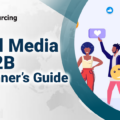A new year means new and innovative trends in marketing, particularly in the tech space. One trend that’s likely to have a huge impact is AI in marketing.
Artificial Intelligence (AI) provides better insights into audiences. It offers the ability to spot online trends and conversations more quickly. Brands that want data-driven strategies for a better return on investment need AI-powered systems.
Why AI Marketing is a Top Trend in 2023
The integration of AI and marketing is growing. More and more companies are turning to AI-powered technology for everything from raising venture capital to connecting with new audiences via chatbot or email marketing.
It’s also becoming a powerhouse in directing content ideation and generation. Brands are becoming more invested in personalized offers and communications because savvy consumers no longer want to feel like they’re being marketed to. Rather, brands need to offer them something useful in return for their information.
The key is to showcase your expertise and stay relevant. Provide insights and personalization that matter to your specific audience. Machine learning marketing pulls information from data on the web. That information guides ideation and creation to better target a particular audience.
Today, AI can collect online customer insights to build profiles and use them to create more relevant marketing.

What Can AI Solutions Do in Marketing?
#1 Visualize and Collect Customer Conversations
While “digital marketing” and “content marketing” may be the top buzzwords right now, marketing as a whole goes far beyond the online world.
Marketing is the process of products and services moving from concept to the customer. In other words, marketing is about creating a demand among customers for what your business has to offer.
Now, where does AI digital marketing fit into this? To create demand for a product or service, you need to understand who the customers are that you’re creating demand for. There is no point in wanting to market fitness products to customers more interested in the travel industry. You need to learn what your customers want, what appeals to them, and the kind of content they enjoy.
This starts by first knowing and understanding who your audience is. From there, you can create buyer personas or segments using AI tools, like news media monitoring or social media listening.
Social listening helps you collect customer richer data. Monitoring customer conversations gives you the ability to craft a better marketing strategy. You no longer have to depend on a “one-size-fits-all” approach that may fall flat.
In 2023, data segmentation won’t be the only trend to track in AI. You can improve your marketing strategy this year using intelligent audience segmentation. That segmentation relies on understanding customer behavior throughout the total customer journey.
#2 See the PR Sparks Before the Blaze
Artificial intelligence marketing helps you see the conversations taking place online. This allows you to get a real-time sense of what your customers say, think, and feel about your business.
The key phrase here is ‘real-time.’ In PR and Communications, when a crisis strikes, time is of the essence to get ahead of the heat and extinguish it before it flares up.
In 2023, PR and Communications are about strategic prevention of a crisis instead of just knowing how to avoid one. AI transforms your PR and Comms strategy by enabling you to take quick action based on real data.
Brands of all sorts and sizes have experienced a disruption in their usual PR and Comms strategies because of social media. With the way that online ‘cancel culture’ is growing, so is online activism on social media. Brands are being boycotted when they don’t live up to their values. For PR and Comms teams, AI systems can help spot online conversations during a crisis. AI can see who is influencing public opinion and what the perception is of your brand during a crisis.
Marketing technology will undoubtedly become more valuable to a brand’s reputation over time.

#3 Analyze Your Metrics to Understand Your Success
Now you have keywords, trending themes, and profiles of social influencers. What are you going to do with this information and social media data? Analyze the data you collected, of course, but do this using an AI-powered tool. The advantage you gain is a deeper insight into your quantitative data.
Vanity metrics are less important. Likes don’t matter so much anymore on platforms like Instagram and Twitter. To understand the true success of your social media campaigns, your social data needs to go deeper than the number of likes and comments.
This is where using an AI-powered tool can make a difference in your marketing. The quantitative metrics don’t always determine whether your marketing strategy was successful. Social media intelligence tools provide deeper insights into those metrics. These tools help you learn what people are saying and where they are saying it.
Instead of cherry-picking data, marketing teams get insights spelled out for them. Tools such as sentiment analysis and heat maps offer visual representations of metrics. Those visualizations help you to better understand the success of every campaign.
#4 Take Action Based on Facts, Not Fiction
If you conduct data analytics and analyze your audience, you’ll begin to see certain patterns emerge. According to Forbes, one AI trend to look for today is predictive analytics. Predictive analytics identifies patterns in your data to improve your marketing strategies.
Meltwater provides social and media intelligence. By examining millions of posts each day from social media platforms, blogs, and news sites, Meltwater helps companies make better, more informed decisions based on insight from the outside. Learn more at meltwater.com.
Subscribe to NewsBites and stay updated on the latest business trends and news.
Disclaimer
This website may contain material sent to the HKTDC by third parties. Without prejudice to any rights, remedies and interests that HKTDC may have, HKTDC is not responsible for any error, omission or inaccuracy in the material. HKTDC reserves the right to omit, suspend or edit any material submitted. The opinions, findings, conclusions and recommendations expressed in such material are those of the authors thereof, and do not necessarily reflect the views of HKTDC.




















